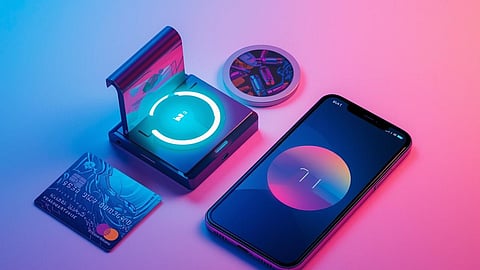

Many still believe magnets can wipe data from phones or credit cards, a myth from floppy disk days. This article explains how modern gadgets and chip cards are designed to resist typical magnetic fields. It clarifies the difference between old magnetic storage and current technology, reassuring Indian consumers about their daily device safety and offering practical insights.
For decades, the idea that magnets can erase data from smartphones or credit cards has been a common fear among users in India and worldwide. This myth harks back to the era of floppy disks and magnetic tapes, where strong magnets could indeed disrupt or erase stored data. However, with the advent of modern technology, this concern has become largely irrelevant. This article explores why typical magnets encountered in daily life won’t harm your smartphone or chip-based credit cards, offers clarity on the difference in data storage technologies, and highlights practical product examples.
Understanding the Roots of the Myth
In the past, storage media like floppy disks, cassette tapes, and even some hard disk drives used magnetic fields to store data. Placing a strong magnet near such devices could scramble or erase the stored information. This association created a lasting impression that magnets are inherently dangerous to electronic gadgets and cards.
How Modern Smartphones Store Data
Today’s smartphones primarily use solid-state storage such as NAND flash memory. Unlike magnetic storage, flash memory stores data electronically without relying on magnetic fields. This means that everyday magnets — like those found in phone cases with magnetic clasps or magnetic mounts used in cars — do not have the intensity to affect the internal memory.
Even the small magnets often embedded in smartphones themselves, like those used for attaching accessories or wireless charging alignment, are carefully designed to avoid interference with the device's memory and functions.
The Reality of Credit Cards and Magnets
Older credit cards used magnetic stripes to store information, which could be affected by strong magnets or demagnetization devices. However, most modern credit cards in India and globally now use EMV chips. These chips are microprocessor-based and store information digitally, making them immune to magnetic interference.
While the magnetic stripe still exists on many cards for backward compatibility, everyday magnets are generally too weak to cause damage. Only specialized and powerful magnets or deliberate tampering can impact magnetic stripes, which is rare in daily life.
Practical Example: Magnetic Phone Holders
Consider a popular gadget in Indian cars — magnetic phone holders. These holders use magnets to keep smartphones stable and accessible during driving. Despite the close contact, they do not erase or damage data on phones. This real-world example reinforces that weak magnets commonly encountered are safe.
What About Magnetic Wallets and Cases?
Magnetic wallets and flip covers for smartphones are trendy accessories. These often use small magnets to secure the cover. Users might worry about data loss, but since modern phones use non-magnetic storage, these magnets are harmless.
Similarly, RFID-blocking wallets use special materials to prevent digital theft but rely on electromagnetic shielding rather than simple magnets.
When Should You Be Cautious?
While typical household or gadget magnets are safe, extremely strong industrial magnets or magnetic devices used for specific purposes could theoretically cause issues. However, such magnets are uncommon in typical Indian homes or offices.
Additionally, magnetic interference might affect some older devices or accessories, such as credit card readers or analog instruments, but not the cards or smartphones themselves.
Conclusion
The fear that magnets will wipe data from your smartphone or credit cards is an outdated myth. Modern Indian consumers can confidently use magnetic accessories without worrying about data loss. Understanding the fundamental shift from magnetic to chip and flash storage technologies can help bust this myth for good. By embracing this knowledge, users can safely enjoy the convenience of magnetic gadgets like phone holders, wallets, and cases, enhancing their daily tech experience without fear.
At marvelof.com, we spotlight the latest trends and products to keep you informed and inspired. Our coverage is editorial, not an endorsement to purchase. If you choose to shop through links in this article, whether on Amazon, Flipkart, or Myntra, marvelof.com may earn a small commission at no extra cost to you.
